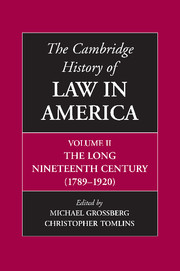Book contents
- Frontmatter
- 1 Law and the American State, from the Revolution to the Civil War: Institutional Growth and Structural Change
- 2 Legal Education and Legal Thought, 1790–1920
- 3 The Legal Profession: From the Revolution to the Civil War
- 4 The Courts, 1790–1920
- 5 Criminal Justice in the United States, 1790–1920: A Government of Laws or Men?
- 6 Citizenship And Immigration Law, 1800–1924: Resolutions Of Membership And Territory
- 7 Federal Policy, Western Movement, and Consequences for Indigenous People, 1790–1920
- 8 Marriage and Domestic Relations
- 9 Slavery, Anti-Slavery, and the Coming of the Civil War
- 10 The Civil War And Reconstruction
- 11 Law, Personhood, and Citizenship in the Long Nineteenth Century: the Borders of Belonging
- 12 Law in Popular Culture, 1790–1920: The People and the Law
- 13 Law and Religion, 1790–1920
- 14 Legal Innovation and Market Capitalism, 1790–1920
- 15 Innovations in Law and Technology, 1790–1920
- 16 The Laws of Industrial Organization, 1870–1920
- 17 The Military in American Legal History
- 18 The United States and International Affairs, 1789–1919
- 19 Politics, State-Building, and the Courts, 1870–1920
- Bibliographic Essays
- Notes on Contributors
- Index
- References
17 - The Military in American Legal History
Published online by Cambridge University Press: 28 November 2008
- Frontmatter
- 1 Law and the American State, from the Revolution to the Civil War: Institutional Growth and Structural Change
- 2 Legal Education and Legal Thought, 1790–1920
- 3 The Legal Profession: From the Revolution to the Civil War
- 4 The Courts, 1790–1920
- 5 Criminal Justice in the United States, 1790–1920: A Government of Laws or Men?
- 6 Citizenship And Immigration Law, 1800–1924: Resolutions Of Membership And Territory
- 7 Federal Policy, Western Movement, and Consequences for Indigenous People, 1790–1920
- 8 Marriage and Domestic Relations
- 9 Slavery, Anti-Slavery, and the Coming of the Civil War
- 10 The Civil War And Reconstruction
- 11 Law, Personhood, and Citizenship in the Long Nineteenth Century: the Borders of Belonging
- 12 Law in Popular Culture, 1790–1920: The People and the Law
- 13 Law and Religion, 1790–1920
- 14 Legal Innovation and Market Capitalism, 1790–1920
- 15 Innovations in Law and Technology, 1790–1920
- 16 The Laws of Industrial Organization, 1870–1920
- 17 The Military in American Legal History
- 18 The United States and International Affairs, 1789–1919
- 19 Politics, State-Building, and the Courts, 1870–1920
- Bibliographic Essays
- Notes on Contributors
- Index
- References
Summary
The subject of the military in American history has attracted considerable attention, both scholarly and popular. Every major war in our history has been the subject of sustained historical analysis. The American Civil War, for example, continues to generate more scholarship than any other event in American history. When it comes to legal history, however, the military suddenly falls into a deep, dark hole. What explains this inconsistency?
The paucity of interest in the intersection of law and the military is puzzling, given that the military has long been an integral part of American civil society. Successful military commanders (Washington, Jackson, Grant, and Eisenhower) have all been elected and reelected president by impressive majorities. Less distinguished generals have also been elected president (Harrison, Taylor, Hayes, and Garfield). At least two others (McClellan and Hancock) ran but failed to win. Far from an impediment, a successful military career has sometimes been of inestimable political value to one seeking elected office.
Military culture, too, has never been totally absent from American life. To a great extent, especially after our major wars, American life has become suffused with a popular nostalgia for military experience. In the half-century after World War II, with the intriguing exception of the Vietnam War period, nostalgia for military culture reached levels that would have been unimaginable a century before. As a result, American militarism, with its emphasis on preparedness, patriotism, and the supposed “superiority” of military values, has had a sustained impact on American culture. Indeed, if cultural norms are a valid indication, the United States has become in the early twenty-first century the most militarized of any Western society, if not the entire world community; and this in a country that has had no military draft for more than a generation.
- Type
- Chapter
- Information
- The Cambridge History of Law in America , pp. 568 - 603Publisher: Cambridge University PressPrint publication year: 2008

